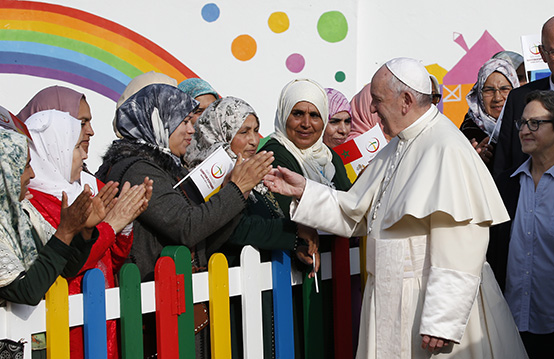
By Inés San Martín
RABAT, Morocco (Crux) – Pope Francis Saturday called the migrant crisis a deep wound that “cries out to heaven,” insisting the response cannot be “indifference and silence.”
Speaking during his March 30-31 visit to Morocco, the pope also said that “the side of the border on which a migrant stands does not make him or her more or less human.”
Given the millions of refugees and forced migrants seeking international protection, as well as victims of human trafficking and other forms of modern-day slavery, the pope said “no one can be indifferent to this painful situation.”
Pope Francis’s words came as he was addressing a group of migrants at a center run by the international Catholic charitable organization Caritas, during the first day of his visit to the Muslim kingdom.
The pontiff also praised a recent Global Compact on safe, orderly and regular migration approved in Marrakech last December during a United Nations-sponsored Intergovernmental Conference.
The agreement, the pope said, makes clear “it’s not just about migrants, as if their lives and experiences were completely unrelated to the rest of society, or their status as persons with rights was somehow ‘on hold’ because of their current situation.”
During the past year, Morocco became a key destination for sub-Saharan African migrants seeking to reach Europe through Spain, which is seven miles away across the Mediterranean Sea. Most travel in rubber boats or use car tires as life preservers.
The latest influx has strained Morocco’s resources and fueled anti-migrant sentiment in Spain, where welcoming centers have collapsed in many cities, leading civil authorities to abandon recently-arrived people in the streets.
In addition, Italy’s anti-immigrant interior minister has closed ports to rescue ships run by charity groups, as has the Spanish government. In a yet-to-air interview, previews of which have been released, Pope Francis says these NGO boats are not being allowed to reach port because governments simply hope the migrants “will drown.”
As he’s done many times, the pontiff on Saturday suggested four verbs – “accept, protect, promote and integrate” – to guide those who want to “act prudently rather than remain silent, to assist rather than isolate, to build up rather than abandon.”
According to the pope, welcoming migrants means offering “broader options” for safe and legal migration, while expanding regular migration can also help prevent new forms of modern day slavery by “merchants of human flesh.”
Collective expulsion, the pontiff said, is unacceptable.
When it comes to “protecting” minors, Pope Francis said it’s particularly needed along migrant routes, which are often “theatres of violence, exploitation and abuse of all kinds.”
“Here, too, it seems necessary to pay particular attention to migrants in situations of great vulnerability, [including] many unaccompanied minors and women,” he said.
The promotion of migrants, the pope argued, begins with the communities of origin, where the right to leave must be guaranteed, as the right not to be forced to migrate.
“I appreciate and encourage programs of international cooperation and transnational development free of partisan interests, which involve migrants as active protagonists,” he said, before adding that “integration” requires “us not to be conditioned by fear and ignorance.”
Speaking directly to the migrants who were in the Caritas center in downtown Rabat, the pontiff said that the Catholic Church knows of their suffering and is concerned to “remind you that God wants us all to live our lives to the full.”
“The Church wants to be at your side to help you achieve the very best for your life. For every human being has the right to life, every person has the right to dream and to find his or her rightful place in our common home!” he said. “Every person has a right to the future.”
Pope Francis was welcomed at the Caritas center by Archbishop Santiago Agrelo, a Spain-born prelate who heads the archdiocese of Tangier in Morocco.
He said that the immigrant who is poor “doesn’t claim rights, but he has them. Doesn’t claim justice, but he’s owed. It’s as if in his indigence he hardly asked permission to live. It’s as if he’s meant to just tell us he exists, he’s there, longing for our closeness, the warmth of our gaze.”
Those who were at the center, Archbishop Agrelo said, are men, women and children from sub-Saharan Africa, who’ve been robbed of resources, have no opportunities and who are experts in suffering. They are also among the few who’ve been able to get the papers that give them the “desired condition of legality.”
Yet it’s important to remember those who don’t have the papers, because they have “nothing,” and are often defined as illegal or irregular.
“They, who are the most vulnerable, carry in their bodies the marks of Christ,” Archbishop Agrelo said. “In them it’s Jesus Christ who hungers for bread and thirsts for justice; in them, our savior shudders with cold and loneliness.”
